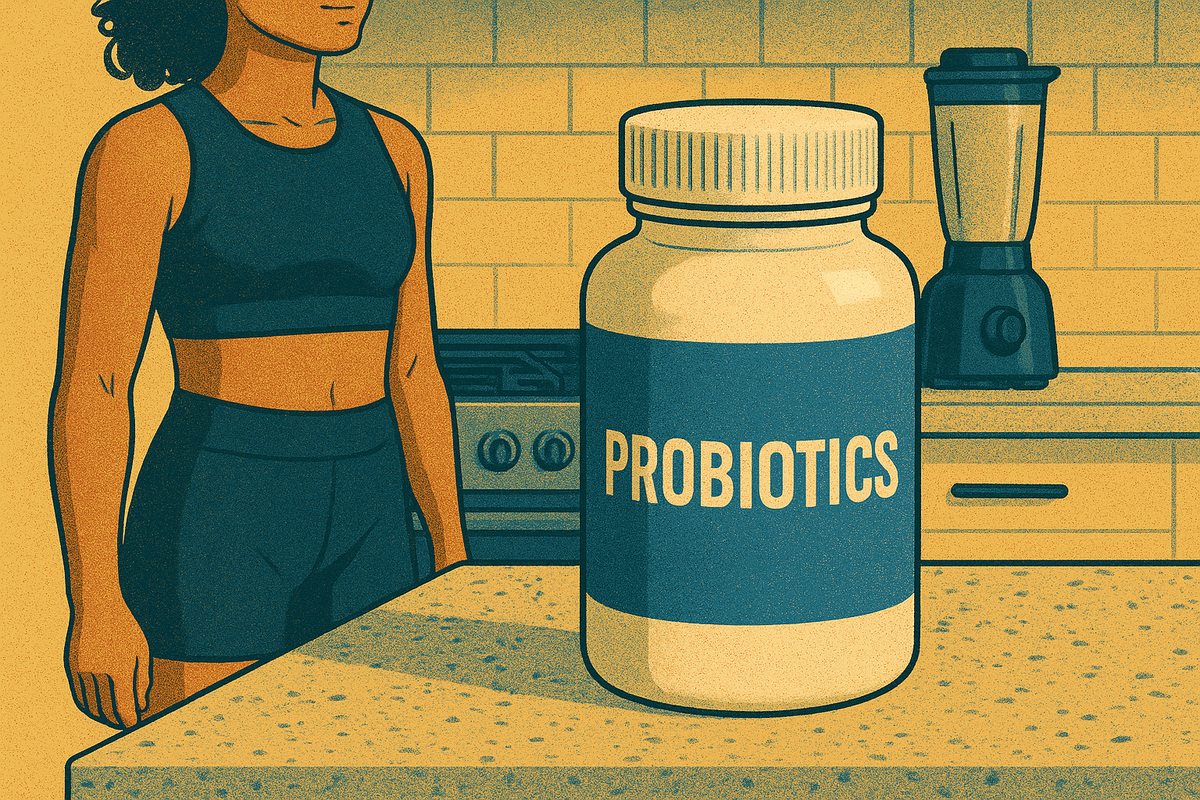
The secret to breaking through your performance plateau might be hiding in an unexpected place - your gut! Recent research suggests that those tiny beneficial bacteria could be powerful allies in your fitness journey.
The Gut-Performance Connection
You’ve probably heard about probiotics for digestive health, but their benefits may extend far beyond a happy tummy. Think of your gut as mission control for many bodily functions: it influences everything from your immune system to your mood, and now research is revealing its impact on athletic performance too.
A fascinating new study with amateur marathon runners found that taking probiotics for just five weeks led to measurable improvements in running distance, reduced gastrointestinal symptoms, and even changes in muscle recovery patterns.
What the Research Shows
Scientists at Hangzhou Normal University in China conducted a double-blind controlled trial with 19 amateur marathon runners. Half received a probiotic blend containing Lactobacillus acidophilus and Bifidobacterium longum, while half got a placebo.
After five weeks, the results were eye-opening:
- The probiotic group ran farther in a 12-minute test (increasing from 2.88 km to 3.01 km)
- They reported significantly fewer gut issues (better scores on gastrointestinal symptom scales)
- They showed improved muscle microcirculation after exercise (measured through sophisticated imaging)
Most importantly, these improvements didn’t happen in the placebo group. The probiotic supplement appeared to be the difference-maker.
How Probiotics Work Their Magic
Imagine your gut as a garden. The probiotics are like adding beneficial plants that crowd out the weeds (harmful bacteria). This creates a healthier ecosystem with far-reaching effects:
Better digestion means better performance: Ever had stomach issues during a long run? Probiotics can help reduce those exercise-induced GI problems that might be holding you back.
Enhanced recovery: The study found changes in muscle blood flow patterns after probiotics, suggesting they may help your muscles bounce back faster after tough workouts.
Potential mood boosts: While the study didn’t show significant emotional changes in five weeks, research suggests a healthy gut microbiome supports better stress management—crucial for maintaining consistent training.
Add Probiotics to Your Fitness Arsenal
Ready to experiment with probiotics for performance? Here’s how to do it smartly:
Choose Wisely
Not all probiotics are created equal. The study used specific strains—Lactobacillus acidophilus and Bifidobacterium longum—which have shown promise for athletes. Look for supplements that clearly list these strains and their quantities (measured in colony-forming units or CFUs).
Be Consistent
The benefits take time to develop. The study ran for five weeks of daily supplementation, so don’t expect overnight miracles. Think of probiotics as a training partner—consistency is key.
Feed Your Friendly Bacteria
Probiotics work better when paired with prebiotics—fibers that feed beneficial bacteria. Incorporate foods like garlic, onions, bananas, and oats to create a gut environment where your probiotics can thrive.
Start Before Big Events
If you’re training for a marathon or other endurance event, begin your probiotic regimen at least a month before race day. This gives your gut microbiome time to optimize before your big challenge.
Beyond Supplements
While probiotic supplements offer a concentrated approach, don’t forget about naturally probiotic foods:
- Yogurt with live active cultures
- Kefir (like a drinkable yogurt with an even higher probiotic count)
- Fermented foods like kimchi, sauerkraut, and kombucha
Many athletes report that a combination of supplements and probiotic-rich foods works best for their performance and recovery.
The Bottom Line
Your gut might be the performance enhancer you’ve been overlooking. Whether you’re a weekend warrior or training for serious competitions, nurturing your internal ecosystem could help you reach new fitness heights. The science is still emerging, but the early results suggest that a happy gut could lead to happier miles, heavier lifts, and faster recovery.
This article is based on research by Wang et al., “Effects of probiotic supplementation on 12 min run performance, mood management, body composition and gut microbiota in amateur marathon runners: A double-blind controlled trial,” published in the Journal of Exercise Science & Fitness (2024).
Discover More
- Does Swearing Make You Stronger? the Surprising Science Behind Cursing and Performance
- Power Up Your Performance With Probiotics: How Gut Health Could Be Your Secret Weapon
- Move Your Mood: How Exercise Lifts Depression and Anxiety During Menopause
- The Weekend Warrior vs. Regular Exercise: What's Best for Slowing Down Your Biological Clock?
- Can Creatine Save Your Workout When Cutting Carbs?
- Carnivore Diet for Athletes: Do You Need Carbs After All?
- Mix It Up! How to Combine Cardio and Strength Training for Maximum Results
- Rocking Your Walk: How Unstable Shoes Could Strengthen Your Feet and Improve Your Balance
- Trail Running Safety: Navigate the Path to Injury-Free Adventures
- Tech Your Way to Better Fitness: How Older Adults Are Using Digital Tools to Stay Active
- Rest Periods Matter: Finding Your Sweet Spot for High-Intensity Sprint Training
- Supercharge Your Jump: How Adding Bands to Your Deadlift Can Boost Performance
- Caffeine Before Exercise: Is Your Pre-Workout Cup of Joe Actually Helping You Burn Fat?
- Paws-Itively Perfect Exercise: How Your Dog Can Be Your Best Workout Partner
- The Long and Short of It: How Pole Length Can Boost Your Cross-Country Skiing Performance
- Time-Restricted Eating: Get Leaner Without Losing Your Gains
- Boost Your Strength & Shed Fat: Essential Amino Acids + Resistance Training
- Finding Your Perfect Fit: How Footwear Affects Performance and Injury Risk
- HIIT vs. Moderate Exercise: The Mood Rollercoaster Your Workout Takes You On
- Hydration Hype: Do Specialty Drinks Boost Exercise Performance? See more
